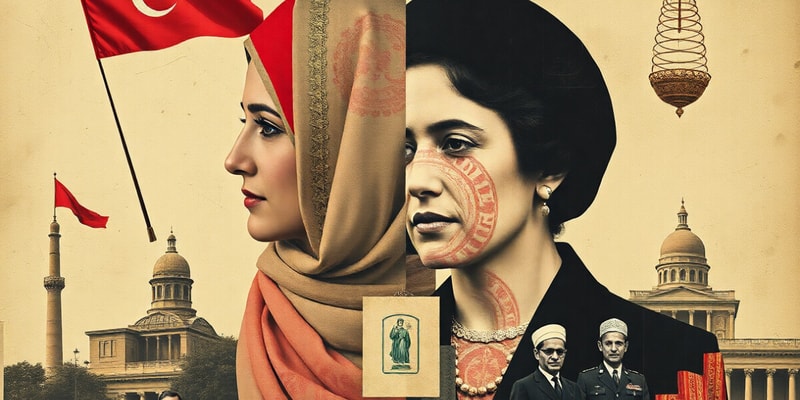Podcast
Questions and Answers
Study Notes
Middle East Politics: Gender Issues
- Discussion from last week highlighted challenges to democracy in the Middle East.
- Today's article explores connections between Islam, gender gap, and democracy.
Fish on Islam and Authoritarianism
- Empirical Study: Research question: Are Muslim societies more prone to authoritarianism?
- Hypothesis: Muslim countries are democratic underachievers.
-
Variables:
- Independent Variable: Islam
- Dependent Variable: Regime type (i.e. democratic or authoritarian)
-
Operationalization:
- Democracy: Dahl's definition (elected officials make policies, universal right to run for office). Data gathered from Freedom House & Polity Project scores.
- Sample: All countries globally (N=156). Subset for Islam as the dominant religion (N=47)
-
Control Variables (other IVs):
- Economic development
- Sociocultural division
- Economic performance
- British colonial heritage
- Communist heritage
- Membership in OPEC
Descriptive Table
- Muslim countries generally have lower scores on democracy.
Bivariate Analysis
- Analysis: Islam, sociocultural division, and OPEC membership suggest a decrease in democracy.
- Table 2: Shows statistically significant results for the independent variables, impacting the dependent variable. Significance levels of correlations and p-values are displayed.
Multivariate Analysis
- Analysis: Models indicate the IVs used in the analysis, including scores gathered from Freedom House and Polity assessments.
- Models: Analyzed across all models, Islam and OPEC membership correlate with lower democracy rates. Economic development positively correlates with higher democracy.
Results
- Significant inverse correlation between Islam and democracy.
- Correlation does not equal causation; this is a key point for caution.
Possible Connections
- Possible reasons for the connection between Islam and authoritarianism, including societal violence issues and trust issues.
- Additional explorations include:
- Whether Muslims are less secular than other religious groups.
- Whether religiosity aligns with authoritarianism and secularism with democracy.
- No statistical analysis is currently possible, relying on case studies
Female Subordination
-
Indicators:
- Literacy rates
- Sex ratios
- Women in government
- Gender empowerment
-
Table 8: Differences in mean scores related to these indicators for Muslim and Catholic countries are presented for qualitative comparison.
Regression Results
- More Islam correlates with wider literacy gaps.
- More Islam correlates with more males than females.
- More Islam correlates with fewer women in government.
- More Islam correlates with lower gender empowerment.
Overall Results
- Increased levels of women's literacy, government representation, and empowerment levels suggest increasing democracy levels.
- Women's oppression negatively impacts democracy.
- This connection is noteworthy in relation to Islamic countries more prone to authoritarianism.
- Additional discussion on why Islam might cause women's oppression is needed.
Studying That Suits You
Use AI to generate personalized quizzes and flashcards to suit your learning preferences.
Related Documents
Description
This quiz delves into the intricate relationship between gender issues, Islam, and democracy in the Middle East. It highlights the challenges faced by Muslim societies in achieving democratic governance while focusing on empirical studies examining the connection between religion and regime types.




